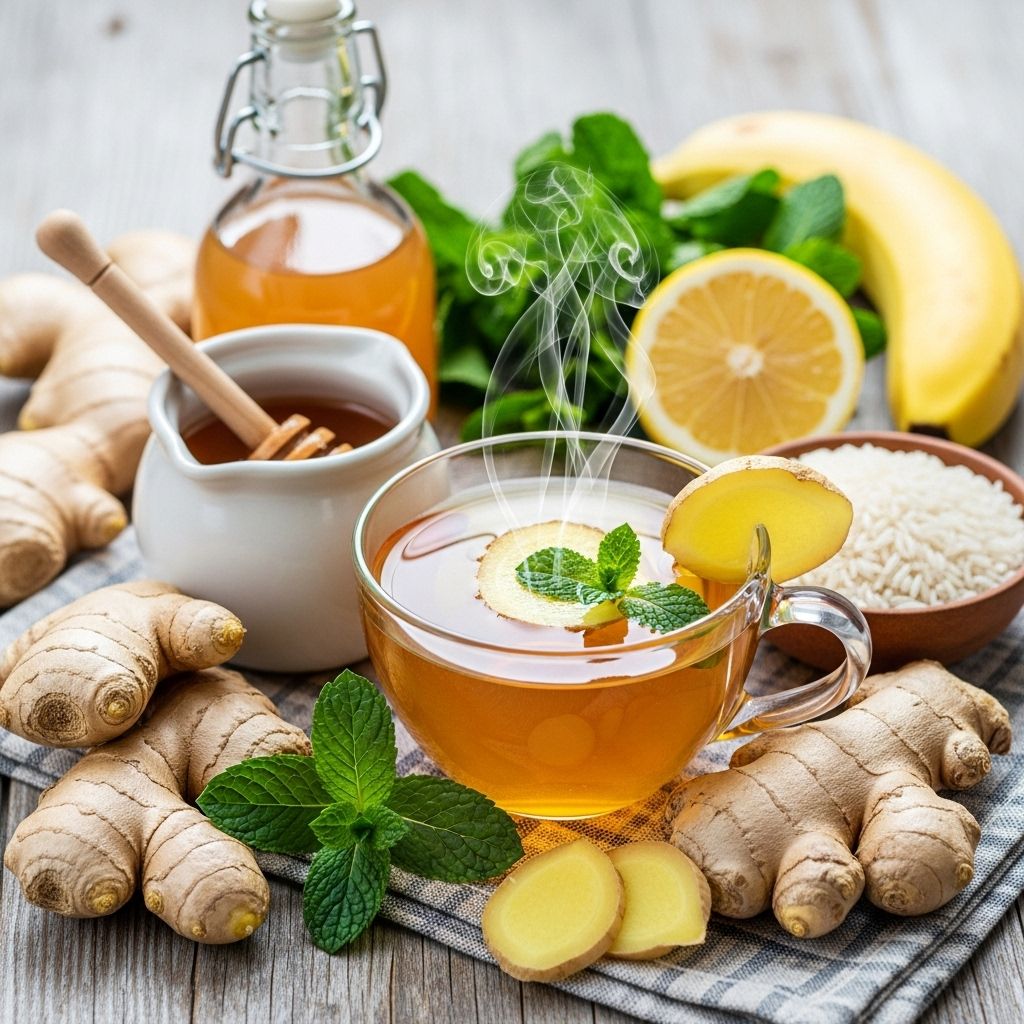Home Remedies for Gastroenteritis: Natural Relief Guide
Nourish your body naturally while easing discomfort with simple kitchen ingredients.

Understanding Gastroenteritis and Its Impact
Gastroenteritis, commonly known as stomach flu, is an inflammation of the stomach and intestines that affects millions of people worldwide. This condition causes uncomfortable symptoms including nausea, vomiting, diarrhea, abdominal cramps, and general malaise. While most cases resolve on their own within a few days, the symptoms can be particularly distressing and disruptive to daily life.
The condition typically develops suddenly, with symptoms appearing within hours of exposure to the causative agent. Gastroenteritis can be caused by various factors including viral infections (which account for 60% of all cases), bacterial infections, parasites, or even chemical irritants. Understanding the nature of this condition is crucial for implementing effective home remedies that can provide relief and support the body’s natural healing process.
The Science Behind Home Remedies
Home remedies for gastroenteritis work by addressing the underlying mechanisms that cause symptoms. The primary goal is to prevent dehydration, restore electrolyte balance, soothe the inflamed digestive tract, and support the immune system’s response to infection. Traditional remedies often contain compounds with anti-inflammatory, antimicrobial, or soothing properties that can help alleviate symptoms naturally.
Many natural ingredients contain bioactive compounds that have been scientifically proven to benefit digestive health. These remedies focus on gentle, supportive care rather than aggressive intervention, allowing the body to heal while providing symptomatic relief. The effectiveness of home remedies lies in their ability to work harmoniously with the body’s natural healing mechanisms.
Essential Hydration and Electrolyte Replacement
Proper hydration forms the cornerstone of gastroenteritis treatment at home. Dehydration is the most serious complication of gastroenteritis, particularly in children, elderly individuals, and those with compromised immune systems. The key is to replace lost fluids and electrolytes gradually and consistently.
Oral Rehydration Solutions
Creating homemade oral rehydration solutions can be highly effective for managing fluid loss. A simple solution can be made by mixing one teaspoon of salt and two tablespoons of sugar in one liter of clean water. This mixture helps restore the delicate balance of electrolytes lost during vomiting and diarrhea episodes.
For children, commercial oral rehydration solutions like Pedialyte are recommended, but homemade versions can also be effective when prepared correctly. The World Health Organization formula includes sodium chloride, potassium chloride, glucose, and sodium citrate in specific proportions to optimize absorption and effectiveness.
Hydrating Foods and Beverages
Beyond water, several foods and beverages can contribute to hydration while providing additional benefits:
- Clear broths: Chicken or vegetable broths provide hydration along with essential minerals and are gentle on the stomach
- Coconut water: Natural source of electrolytes including potassium and magnesium
- Herbal teas: Chamomile, ginger, and peppermint teas can provide hydration while offering anti-inflammatory and digestive benefits
- Diluted fruit juices: Apple juice diluted with water can provide glucose and some electrolytes
Natural Anti-Nausea Remedies
Nausea and vomiting are among the most uncomfortable symptoms of gastroenteritis. Several natural remedies have proven effective in reducing these symptoms without the side effects associated with pharmaceutical anti-nausea medications.
Ginger: Nature’s Anti-Nausea Medicine
Ginger has been used for centuries to treat nausea and digestive issues. The active compounds gingerol and shogaol have powerful anti-nausea properties that work by affecting serotonin receptors in the digestive system. Fresh ginger can be prepared as a tea by steeping sliced ginger root in hot water for 10-15 minutes. Ginger capsules, candies, or even small pieces of fresh ginger can also provide relief.
Peppermint for Digestive Comfort
Peppermint contains menthol, which has antispasmodic properties that can help relax the muscles of the digestive tract and reduce nausea. Peppermint tea or simply inhaling peppermint essential oil can provide quick relief from nausea symptoms. However, peppermint should be used cautiously in young children as it can be too strong for their systems.
Soothing the Inflamed Digestive Tract
The inflammation caused by gastroenteritis can be addressed using various natural ingredients that possess anti-inflammatory and protective properties for the digestive system.
Rice Water: Traditional Digestive Soother
Rice water, the starchy liquid left after cooking rice, has been used traditionally to treat diarrhea and soothe digestive inflammation. It provides easily digestible carbohydrates and helps firm up loose stools. To prepare rice water, boil one cup of rice in six cups of water until the rice is tender, then strain the liquid and drink it warm throughout the day.
Chamomile Tea for Anti-Inflammatory Relief
Chamomile contains compounds like chamazulene and bisabolol that have anti-inflammatory and antispasmodic properties. Drinking chamomile tea can help reduce inflammation in the digestive tract, ease cramping, and promote relaxation. The tea should be prepared using dried chamomile flowers steeped in hot water for 5-10 minutes.
Probiotic Support for Gut Health
Probiotics play a crucial role in maintaining digestive health and can be particularly beneficial during gastroenteritis recovery. These beneficial bacteria help restore the natural balance of gut microflora that may be disrupted during illness.
Natural Probiotic Sources
Several fermented foods naturally contain probiotics that can support digestive recovery:
- Plain yogurt: Contains live cultures of beneficial bacteria, but should be introduced gradually
- Kefir: Fermented milk drink rich in diverse probiotic strains
- Fermented rice: Traditional preparation that provides probiotics and easy-to-digest carbohydrates
- Buttermilk: Contains beneficial bacteria and is often well-tolerated during recovery
Dietary Management During Gastroenteritis
Proper nutrition during gastroenteritis requires a careful balance between providing necessary nutrients and avoiding foods that could worsen symptoms. The traditional BRAT diet (bananas, rice, applesauce, toast) has been a cornerstone of gastroenteritis management, though modern recommendations are more flexible.
Foods to Include
During the acute phase of gastroenteritis, focus on easily digestible foods that provide energy and nutrients without irritating the digestive system:
- Plain white rice: Easy to digest and provides carbohydrates for energy
- Bananas: Rich in potassium and pectin, which can help firm up stools
- Plain crackers: Saltines can help settle the stomach and provide some electrolytes
- Boiled potatoes: Provide carbohydrates and potassium without added fats
- Lean proteins: Small amounts of boiled chicken or fish can be introduced as symptoms improve
Foods to Avoid
Certain foods can exacerbate gastroenteritis symptoms and should be avoided during the acute phase:
- Dairy products (except small amounts of plain yogurt)
- Fatty or fried foods
- Spicy foods
- High-fiber foods
- Caffeine and alcohol
- Artificial sweeteners
Herbal Remedies and Their Applications
Traditional herbal medicine offers several options for managing gastroenteritis symptoms. These remedies should be used with caution and proper knowledge of their effects and contraindications.
Fennel Seed Tea
Fennel seeds contain anethole and other compounds that can help reduce gas, bloating, and digestive spasms. Fennel tea can be prepared by steeping one teaspoon of crushed fennel seeds in hot water for 10 minutes. This remedy is particularly effective for reducing abdominal cramping and gas.
Turmeric for Anti-Inflammatory Support
Turmeric contains curcumin, a powerful anti-inflammatory compound that can help reduce digestive tract inflammation. A small amount of turmeric powder can be mixed with warm milk or water, though it should be used sparingly as it can be irritating to some people’s stomachs during acute illness.
When to Seek Medical Attention
While home remedies can be effective for managing mild to moderate gastroenteritis symptoms, certain situations require immediate medical attention. It’s important to recognize when symptoms indicate a more serious condition that requires professional treatment.
Warning Signs
Seek medical care immediately if you experience:
- Signs of severe dehydration (dizziness, dry mouth, little or no urination)
- High fever (over 102°F/39°C)
- Blood in vomit or stool
- Severe abdominal pain
- Symptoms lasting more than several days
- Signs of dehydration in children or elderly individuals
Prevention Strategies
Preventing gastroenteritis is always preferable to treating it. Several practical measures can significantly reduce the risk of developing this condition:
- Hand hygiene: Regular handwashing with soap and water
- Food safety: Proper food storage, preparation, and cooking
- Water safety: Drinking clean, safe water and avoiding contaminated sources
- Personal hygiene: Avoiding contact with infected individuals when possible
Frequently Asked Questions
Q: How long does gastroenteritis typically last?
A: Most cases of viral gastroenteritis resolve within 2-3 days, though some symptoms may persist for up to a week. Bacterial gastroenteritis may last longer and sometimes requires antibiotic treatment.
Q: Can I use home remedies for children with gastroenteritis?
A: Many home remedies can be safely used for children, but doses should be adjusted and some remedies like peppermint may be too strong. Always consult a pediatrician for children under 5 years old.
Q: Is it safe to use probiotics during acute gastroenteritis?
A: Probiotics can be beneficial during recovery, but they should be introduced gradually. Start with small amounts of plain yogurt or kefir once vomiting has stopped.
Q: Should I force myself to eat during gastroenteritis?
A: Don’t force eating if you’re nauseous or vomiting. Focus on staying hydrated first, then introduce bland foods gradually as your appetite returns.
Q: Can gastroenteritis be treated entirely with home remedies?
A: Most cases of viral gastroenteritis can be managed effectively with home remedies, but bacterial or parasitic infections may require medical treatment with antibiotics or antiparasitic medications.
Conclusion
Home remedies for gastroenteritis offer safe, effective ways to manage symptoms while supporting the body’s natural healing process. The key to successful home treatment lies in proper hydration, gentle nutrition, and the judicious use of natural remedies that address specific symptoms. While these approaches can be highly effective for most cases of gastroenteritis, it’s important to recognize when medical intervention is necessary and to seek professional care when symptoms are severe or persistent. By combining traditional wisdom with modern understanding of the condition, individuals can effectively manage gastroenteritis symptoms and promote faster recovery in the comfort of their own homes.
References
- https://www.merckmanuals.com/professional/gastrointestinal-disorders/gastroenteritis/overview-of-gastroenteritis
- https://www.niddk.nih.gov/health-information/digestive-diseases/viral-gastroenteritis/treatment
- https://my.clevelandclinic.org/health/diseases/gastroenteritis
- https://www.webmd.com/digestive-disorders/gastroenteritis
- https://www.mayoclinic.org/diseases-conditions/viral-gastroenteritis/symptoms-causes/syc-20378847
- https://medlineplus.gov/gastroenteritis.html
- https://www.mayoclinic.org/diseases-conditions/viral-gastroenteritis/diagnosis-treatment/drc-20378852
- https://my.clevelandclinic.org/health/diseases/12418-stomach-flu
Read full bio of medha deb












